A Video-Presentation of the Book "Conquest of the Seven Ysles of Canaria - Tomás Marín de Cubas - A Critical Edition by Antonio M. López Alonso"
Let us celebrate the World Book Day! (Video in Spanish)
https://www.youtube.com/watch?v=W8_-9j8Vka4…
Let us celebrate the World Book Day! (Video in Spanish)
https://www.youtube.com/watch?v=W8_-9j8Vka4…
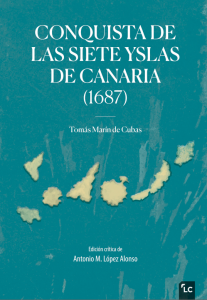 PLEASE FIND BELOW SOME LINKS TO MEDIA INTERVIEWS ON THIS BOOK.
PLEASE FIND BELOW SOME LINKS TO MEDIA INTERVIEWS ON THIS BOOK.
EXPLANATORY NOTE: Due to some incoming enquiries, we must stress as indicated in this post that ours is not a reissue of the 1694 copy-manuscript by Marín de Cubas, but the first edition of his 1687 unpublished manuscript.
We are very pleased to announce the publication in LeCanarien Ediciones of our second printed work; the first and long-awaited edition of one of the fundamental works for the knowledge of the ancient history of our Archipelago: CONQUEST OF THE SEVEN YSLES OF CANARIA by Canarian physician and historian Tomás Marín de Cubas.
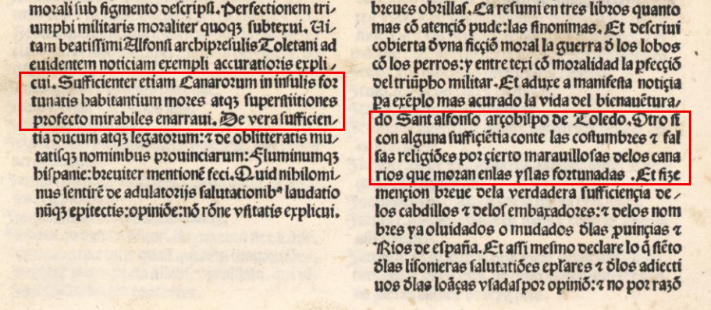
An excerpt from folio 548v. of the Universal Vocabulary in Latin and in Romance (1490) by Alfonso de Palencia where he declares having written a work on the customs and religions of the Canarian people (source: Biblioteca Virtual de Andalucía / PROYECTO TARHA -boxes-).
Unfortunately all this does not make up for the lack of Alonso de Palencia’s work, a loss that we will always deplore due to the the first-hand Canarian news it would provide and for being the first Castilian information on Gran Canaria’s indigenous customs.
Prof. Juan Álvarez Delgado (1963) –Alonso de Palencia (1423-1492) y la historia de Canarias, p. 77–[1]This translation by PROYECTO TARHA.
He negotiated in the name of the Catholic Monarchs the capitulations preceding the royal invasion of Gran Canaria, supervised and coordinated the logistics of the conquest expeditions put under the command of Juan Rejón in 1478 and 1479, and shortly thereafter personally proposed Pedro de Vera as the most qualified man to end the war of Canaria, entrenched from the beginning by the interpersonal quarrels of the Castilian captains and the strong indigenous resistance.
With this background, no one would suspect that Alonso or Alfonso de Palencia (Palencia, 1423 – Seville, 1492) was the author of the first monographic study devoted entirely to the culture and religion of the ancient Canarians. And it is true that a brief analysis of this character and his extensive literary production makes it hard to find in the Castile of his time a better connected and prepared individual to face a work of this kind.
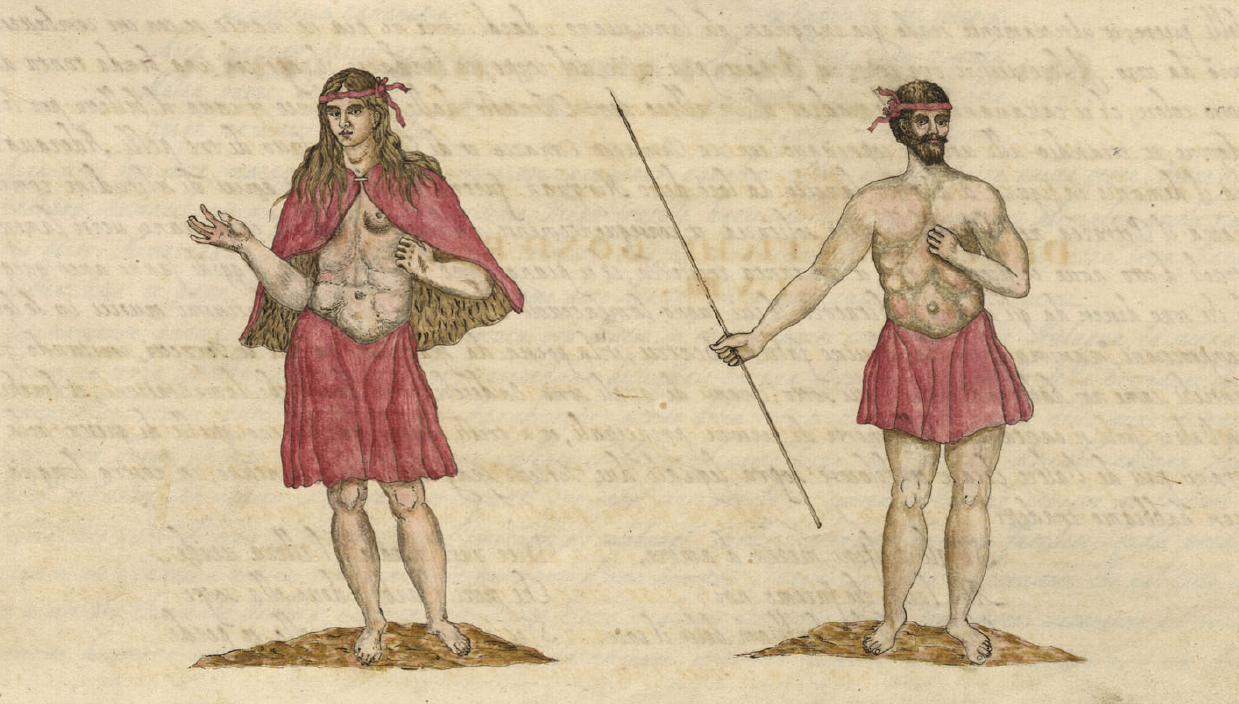
Indigenes of La Gomera, depicted by Leonardo Torriani in 1590 (source: Biblioteca Geral da Universidade de Coimbra, catalogue number Ms. 314, fol. 81r.).
To fully clarify the content of these 120 documents has been an immense job. And since an illustrious Canaryman has described me as a typical German, with a file, I must confess frankly that I own an immense one, […][1]This translation by PROYECTO TARHA.
Dominik Josef Wölfel (The Gomerans sold by Pedro de Vera and Doña Beatriz de Bobadilla, p. 23)
Present year 2018 began with very good news for Canarian historiography: the acquisition by El Museo Canario of the personal file of Professor Dominik Josef Wölfel (Vienna, 1888-1963), kept at the Institutum Canarium in Vienna. Making the most, in addition, of the recent publication of our last two posts on the Gomeran rebellion of 1488, now we issue another of our recommended essentials, which we owe to the prestigious author of the Monumenta Linguae Canariae.
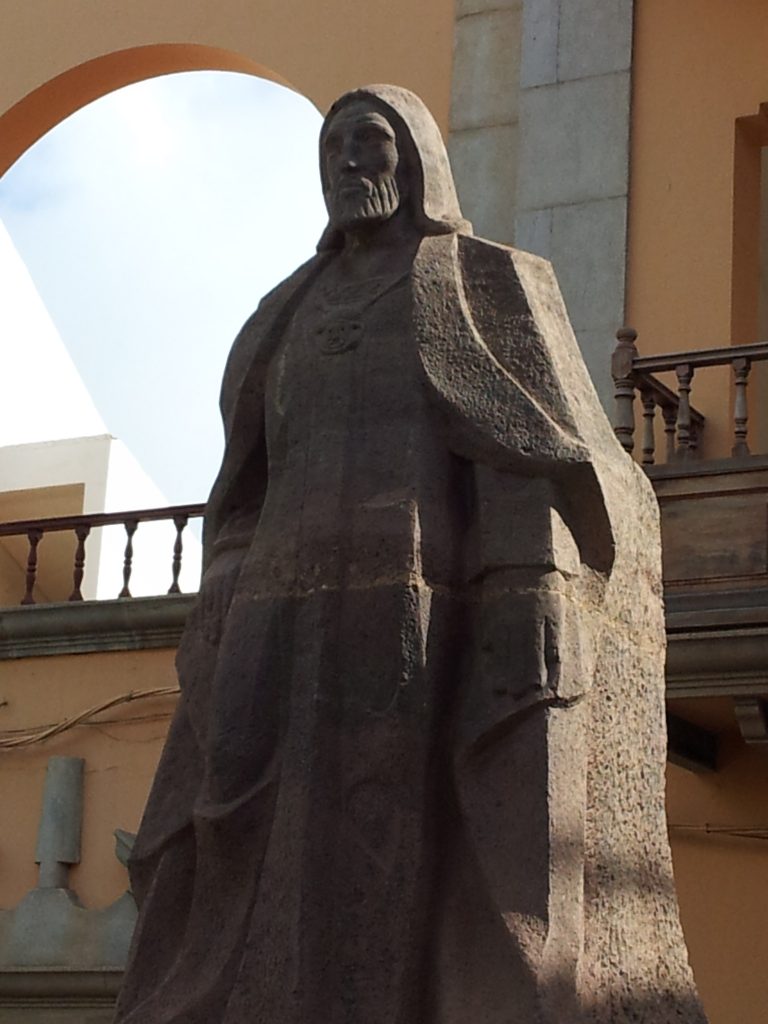
Idealized statue of Tenesor Semidán or Don Fernando Guanarteme by sculptor Juan Borges Linares, located at Gáldar, Gran Canaria (source: PROYECTO TARHA)
[…] He told them things of Castile and the Court and the great power of their Highnesses and that he did not recognize his lordship as worthy, nor those on this Island because that of their Highnesses was true […][1]Witness Alonso Hernández de Arévalo’s answer to the ninth question of the interrogation.
As we indicated in one of our Essentials, only three merit reports related to the conquest of the Canary Islands are preserved. This time we deal with the second of these important public documents: Don Fernando Guanarteme’s merit report, also known as the Guanarteme Report. (more…)
In 1966, as a result of an investigation encouraged by Professor Antonio Rumeu de Armas, then doctoral student Miguel Ángel Ladero Quesada published in Anuario de Estudios Atlánticos the transcription of some surprising documents that shed new light on the royal conquest of the Canary Islands which at the same time raised new questions. This valuable information appeared in three expense accounts, a kind of document whose arid and routine nature does not invite to presage any interesting data. Nothing further from reality.
The first account, dated between 1481 and 1482, right in the middle of the conquest of Gran Canaria, was signed by Pedro de Arévalo, supplier of the conquering army. The second relation of expenses was signed by Juan de Frías, Governor of the Palace of Córdoba –not to be confused with his namesake Bishop of Rubicón–. Finally, the third account showed the rubric of Antonio de Arévalo, son of the former, designated payer of the Castilian hosts that participated in the War of Canaria after its ending.
On the verge of celebrating PROYECTO TARHA‘s first anniversary, we could not but celebrate publishing the first prototype of which we announced as one of …
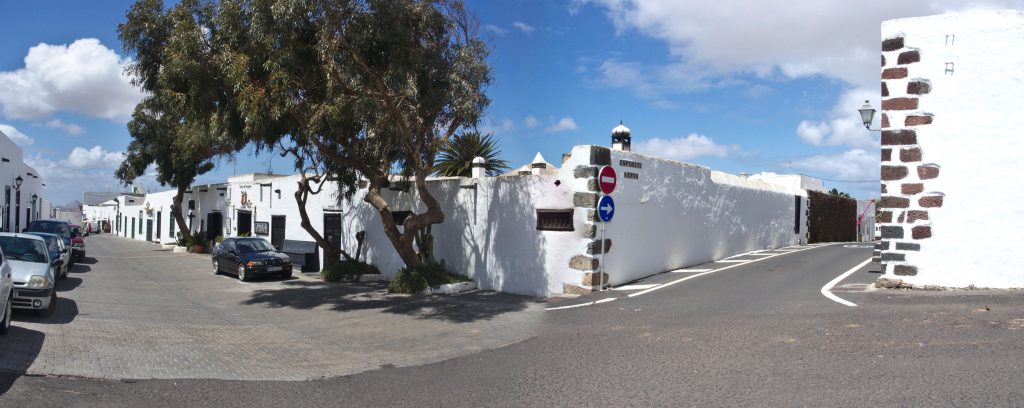
Location of the old manor houses in Teguise, Lanzarote. The streets of the so-called Gran Aldea witnessed the clashes among the neighbors and the henchmen of Inés Peraza and Diego García de Herrera (source: PROYECTO TARHA).
[…] the King […] had ordered him, among other words, to come another day, in the wee hours, to the quarter of the fat bell, through Xerez wicket, to speak with Their Highnesses, and that no one should see him nor take another person with him; […] and when he returned […] he said how His Highness had asked him for the conquest of this island, before a secretary of His; and that he had given it all in writing, and what population and places there were on the island, and the size of the island; and how many people would have to come from Castile, to conquer it and place it under the obedience of Their Highnesses on this island, and what ships would be necessary, and that everything was given in writing; and that […] His Highness had asked him if he knew any ship masters and that he would bring Him some […][1]RUMEU (1990, pp. 677-678). This translation by PROYECTO TARHA..
Let us clarify that this title, sort of a Hollywood one, is not that of the essential we want to show today, but the story contained in it, worthy of a screenplay, justifies this liberty.
DORAMAS
Guanda demedre tamaranone tasuguiet besmia
mat acosomuset tam obenir marago, aspe anhianacha
aritamogante senefeque senefeque.
CURIOSITY
What does he say, sister?
WISDOM
He is inviting us to lunch; and he says
he will give us many potages, Canarian style, and he asks us
to sit down.[1]CAIRASCO (2005), p. 34. This translation by PROYECTO TARHA.
Although not being a core work to know the ancient history of the Canary Islands, joining this to our Essentials is justified by its literary and philological significance.
Composed between 1581-1582 by Canarian canon, musician, poet and playwright Bartolomé Cairasco de Figueroa (Real de Las Palmas, 1538-1610), so-called Comedia del Recibimiento (Comedy of the Reception) is a small stage play whose destiny was to be represented to welcome the new bishop of Canaria, Fernando de Rueda. In this play, six characters –five allegorical: Wisdom, Curiosity, Invention, Gáldar and Guía, the two latter representing the homonymous Grandcanarian locations, and one historical, Canarian warrior Doramas– introduce the Archipelago virtues to the Prelate.

A view of Teguise town (Lanzarote) in 2016 from Mount Guanapay. Named Gran Aldea (Great Village) by Europeans in the fifteenth century, it was the capital of the Seigneury of the Isles of Canaria and the scene of residents insurrection against Inés Peraza and Diego de Herrera’s rule that gave rise to Cabitos’ Inquiry (source: PROYECTO TARHA)..
[…] and we as people few and poor, miserable, ignorant, living on this island, poor having nothing to provide us or feed us but the skies and goat herds, and we have no other property or income to live on. For, Lord, if we pick bread one year, two years we do not pick it, and so we are living on this land, in our misery and poverty, and they take the above said tax from us […]. And about that all, the above said Lords Diego de Herrera and Doña Inés, his wife, are not contented […] every day they do us more harm, taking us out of our homes, making us abandon our wives and children, taking us by force against our wills to other islands of infidels where many of us died and still die and make us keep towers and fortresses […] not wanting neither to give nor to pay us any wage […] and we dare neither to tell them nor to repeat to the above said Lords nothing of such grievances they do to us because of the great fear of them we have until make it known to Your Highness, to whom we plead with loud voices, as very miserable and aggrieved people, that Your Highness remedy us with justice, for, Lord, we are isolated on the islands, on the said island of Lanzarote, which is far apart from the kingdoms of Spain, westwards in the sea. [1]Aznar Vallejo (1990, pp. 173-174) –adapted from old Castilian by PROYECTO TARHA–.
Promoters of this plead never imagined that their requests would give rise to the most important public file kept on the conquest of the Canaries.